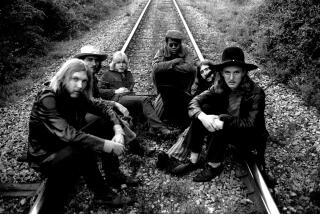Revealing Another Side of Mills Brothers : THE MILLS BROTHERS, “The Anthology: 1931-1968”, <i> MCA</i> ***
- Share via
If you know this classic vocal group chiefly by its sweet-sounding but essentially tame ‘50s and ‘60s recordings, this two-CD retrospective is a revelation.
After hearing the group’s early work, you will be able to appreciate the imagination and range of the quartet--and understand why it has been frequently cited as key in the evolution of doo-wop.
The brothers--Donald, Harry, Herbert and John--got their start in radio in Cincinnati, where their ability to imitate musical instruments with their voices made them a bargain in the days when most music programs featured live rather than recorded performances. The group was cheaper to put on the air than its rivals because you didn’t have to hire a backing band.
“There were a dozen live programs on WLW and we got to the point where we were on every one of them,” Harry Mills once said. “Every sponsor gave us a different name. On one show, we were the Steamboat Four; on another, the Tasty Yeast Jesters; on a third they called us Will, Willie, Wilbur and William.”
Eventually, the Mills Brothers became known nationwide by their own name and their first single--1931’s “Tiger Rag”--is widely credited with being the first single ever by a vocal group to sell a million copies. The hits--from “Paper Doll” and “You Always Hurt the One You Love” to “Cab Driver”--continued into the late ‘60s, though the early recordings showed the most consistent inventiveness and wit.
Albums are rated on a scale of one star (poor), two stars (fair), three stars (good), four stars (e x cellent).
More to Read
The biggest entertainment stories
Get our big stories about Hollywood, film, television, music, arts, culture and more right in your inbox as soon as they publish.
You may occasionally receive promotional content from the Los Angeles Times.





